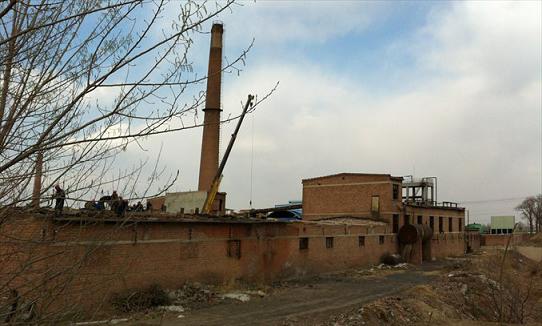
 |
| Workers dismantlel the Jianxin Chemical Plant in Cangxian, Hebei Province on April,9. The plant was closed down in September 2011 because of a leak, but the chemical waste left behind had not been cleaned up until recent media exposure.( Photo by Zhang Zhilong/ GT) |
Deng Lianjun, a county-level director with the environmental protection bureau of Hebei Province, has been sacked, not because of dereliction of duty in ignoring the water pollution his villagers have suffered for over 20 years, but due to his inappropriate comparison when trying to explain the problem away.
Deng got into hot water when he told a CCTV report on April 3 that "water is red, but that doesn't mean it's polluted. When you put a handful of red beans in, the water looks red, and the boiled rice looks red, too." This garnered him the nickname "red bean director."
Deng's words predictably enraged the public and brought attention to this small village. Not even the plant he so awkwardly tried to protect backed him up.
The Jianxin Chemical Plant, at the southeast of Xiaozhuzhuang village in Cangxian county, issued an apology on April 5, acknowledging deficiencies in the clean-up process after manufacturing chemical materials.
The plant is surrounded by wheat fields, whose irrigation as well as locals' drinking water depends on the Nanpai River that runs along the plant.
Polluted water was discharged directly into the river before the plant was closed down in September 2011 because of a leak, a villager surnamed Zhu told the Global Times.
However the factory equipment remained there, and the plant didn't clean up the chemical waste.
The plant manufactured chemical materials used to make dyes or plastics, and its discharged water contained aniline, a poisonous compound, which was later proved by sample tests.
On April 9, two days after local officials, media and environmental protection experts descended on the site, some workers were still busy dismantling equipment and pumping polluted water out of a ditch near the water. The brackish water that was still in the ditch was a dark red color and a pungent smell wafted near the plant, when this reporter visited the site.
The ditch is connected directly to the Nanpai River, and the water used to run into the river nearby, until the confluence point was blocked off recently.
Helping the helpless
Villagers clearly know how bad the environment they are living with now is. They used to drink water from the wells, still a rare feat in many rural parts of China, but this became tougher in 1988 once the plant set up shop.
Now, water from shallow wells is not drinkable at all and villagers have to dig deeper but the water is still unclean, and bottled water is a safer but pricier option.
For cooking, villagers still rely on water from deep wells. "Without adding anything, the rice turns yellow when it is boiled," said Zhang, who lives less than a kilometer from Xiaozhuzhuang.
Out of nearly 800 people living in the village, 24 have died of cancer in recent years and six more are ill.
"Among those dead, at least half were only in their early 50s," another villager told the Global Times. "Those who could afford it bought houses in cities and sent their children to school there, but the poorer people have no choice," she sighed.
But protests were useless since the boss of the Cangxian branch of the Jianxin plant had connections and nobody could influence him, Zhu lamented.
For years, villager Zhu Yongbo visited petition departments from town to provincial level, but all in vain. "I shall never again be a petitioner. It doesn't work at all," Zhu told the media.
A further source of disillusion for Zhu and others was the complete lack of professionalism shown by environmental officials. Once, when the water in the ditch was bubbling with noxious chemicals, an official assured villagers at the scene that it was safe to drink. One villager even offered true challenge that if the official dared to sip the water once, he would do so 10 times, but the official did not comply.
Besides Jianxin chemical plant, several other chemical plants nearby are still under operation, leaving the villagers feeling entombed. These days those plants have stopped operation because they don't want to be exposed as Jianxin has been. But the villagers said they will soon resume.
"Sometimes we cannot breathe even it is sunny, especially in the morning. When it is windy, the situation is worse because dense smoke from the tall chimneys of the plants drifts toward us," one villager lamented.
Past is long gone
For Zhu, pastoral scenes of the past such as bathing in the river, seeing large carp leap from the water or finding big tortoises along the riverbank are long gone.
One man, in his 50s, spoke up to counter these views, telling the Global Times that he is still able to find good fish in the river. However, according to Zhu, this man was a close relative of the chemical plant boss. One woman approached and advised a visit to the plant itself, but others were more hostile, including one man dressed in business attire who questioned the Global Times reporter's purpose in the village.
Trying to visit the Jianxin chemical plant proved fruitless. Staff were busy dismantling the roof of the main building while a guard at the gate turned the reporter away and refused to answer questions.
Deng was removed from office by the local government on April 5, but no specific reason was disclosed. By press time, the environmental protection bureau couldn't be reached by the Global Times.
"It is because of pressure from public opinion that the local government decided to sack him," Lü Keqin, Secretary-General with the All China Environment Federation, told the Legal Daily.
"If he failed to do his duty, the reasons for his failure should be disclosed to the public. But if it's just because of what he said, firing him doesn't signify better protection for the environment," said Lü.
The most urgent task for the local government is to find a real solution for the pollution blighting the village, he proposed.
Deng's words invited criticism nationwide but the local government could have been much more reactive earlier. Villagers have been petitioning about the pollution for years and yet the local government waited until its back was up against the wall to take any steps.
Counting the cost
Once the scandal broke, samples were collected from nine sites around Xiaozhuzhuang village. The test result from the well of a chicken farm, one of the sites, showed that levels of aniline were 70 times higher than the recommended standards of drinking water, reported CCTV.
Local newspaper Yanzhao Metropolitan News reported in late March that about 700 chickens had died around that time after drinking water taken from a 30-meter-deep well, quoting the owner of the chicken farm, Zhou.
Both government officials and owners of the chemical plant have shifted into damage control but it may be too late. Chen Xuewei, vice president of Jianxin Chemical Plant read the apology letter to the public and bowed.
But several days earlier, he told a CCTV reporter that his plant didn't discharge waste water and that it was all transported to a wastewater treatment plant. "We are qualified and pass supervision checks every time," Chen told CCTV.
Han Jindong, vice director with the county's environment protection bureau, admitted that his office had not "arranged scientifically rigorous supervision and observations of the site." He also revealed that the supervision checks had not been frequent enough to prevent the plant from secretly discharging any amount of waste water it desired.
Some may say that any actions taken are better late than never. It remains to be seen how such belated attention will benefit the villagers and whether this will snowball to bring notice to other rural villages and counties facing similar threats.
For Wang Hao, director of the Chinese Academy of Sciences' Institute of Water Resources, controlling the pollution by shutting down the plant is only the first of many needed steps. The polluted water has had years to make its way deep underground, affecting groundwater as well as nearby soil quality.
In such a scenario, clean-up costs would soar to make the ground arable again. Even planting trees or cotton, which can be used to clean up soil, instead of crops would be of little help, given the amount of soil treatment necessary.
In a poignant observation, given the greed that led Jianxin to run roughshod over environmental interests and agricultural safety, Wang estimated that the cost of cleaning-up the damage done by the chemical plant down the years would be higher than its entire output value.
Latest development of H7N9 in China[Special]
















 WWII TV dramas border on the ridiculous
WWII TV dramas border on the ridiculous


![]()
